- Home
- Charles Bukowski
Hot Water Music Page 2
Hot Water Music Read online
Page 2
“I can’t make it, god damn it, anybody want a drink?”
They didn’t answer so Henry poured himself one. “I even tried to make it playing the horses. I started well but I hit a slump. I had to stop. I can only afford to win.”
The professor started to explain his system for beating twenty-one at Vegas. Henry walked over to the editor.
“Let’s go to bed,” he said.
“You’re funny,” she said.
“Yeah,” he said, “like Lenny Bruce. Almost. He’s dead and I’m dying.”
“You’re still funny.”
“Yeah, I’m the hero. The myth. I’m the unspoiled one, the one who hasn’t sold out. My letters are auctioning for $250 back east. I can’t buy a bag of farts.”
“All you writers are always hollering ‘wolf.’”
“Maybe the wolf has finally arrived. You can’t live off your soul. You can’t pay the rent with your soul. Try it some time.”
“Maybe I ought to go to bed with you,” she said.
“Come on, Pat,” said the prof, standing up, “we’ve got to make Del Mar.”
They walked to the door. “It was good to see you.”
“Sure,” Henry said.
“You’ll make it.”
“Sure,” he said, “goodbye.”
He walked back to the bedroom, took off his clothing and got back into bed. Maybe he could sleep. Sleep was something like death. Then he was asleep. He was at the track. The man at the window was giving him money and he was putting it into his wallet. It was a lot of money.
“You ought to get a new wallet,” said the man, “that one’s torn.”
“No,” he said, “I don’t want people to know I’m rich.”
The doorbell rang. “Hey Hank! Hank!”
“All right, all right…wait a minute…”
He put his clothes back on and opened the door. It was Harry Stobbs. Stobbs was another writer. He knew too many writers.
Stobbs walked in.
“You got any money, Stobbs?”
“Hell no.”
“All right, I’ll buy the beer. I thought you were rich.”
“No, I was living with this gal in Malibu. She dressed me well, fed me. She booted me out. I’m living in a shower now.”
“A shower?”
“Yes, it’s nice. Real glass sliding doors.”
“All right, let’s go. You got a car?”
“No.”
“We’ll take mine.”
They got into his ’62 Comet and drove up toward Hollywood and Normandy.
“I sold an article to Time. Man, I thought I was in the big money. I got their check today. I haven’t cashed it yet. Guess what it reads?” asked Stobbs.
“$800?”
“No, $165.”
“What? Time magazine? 165 dollars?”
“That’s right.”
They parked and went in to a small liquor store for the beer. “My woman dumped me,” Henry told Stobbs. “She claims I drink too much. A bareass lie.” He reached into the cooler for two six-packs. “I’m tapering off. Bad party last night. Nothing but starving writers, and professors who were about to lose their jobs. Shop talk. Very wearing.”
“Writers are whores,” said Stobbs, “writers are the whores of the universe.”
“The whores of the universe do much better, my friend.”
They walked to the counter.
“‘Wings of Song,’” said the owner of the liquor store.
“‘Wings of Song,’” Henry answered.
The owner had read an article in the L.A. Times a year ago about Henry’s poetry and had never forgotten. It was their Wings of Song routine. At first he had hated it, and now he found it amusing. Wings of Song, by god.
They got into the car and drove back. The mailman had been by. There was something in the box.
“Maybe it’s a check,” Henry said.
He took the letter inside, opened two beers and opened the letter. It said,
“Dear Mr. Chinaski, I just finished reading your novel, Nightmare, and your book of poems, Photographs From Hell, and I think you’re a great writer. I am a married woman, 52 years old, and my children are grown. I would very much like to hear from you. Respectfully, Doris Anderson.”
The letter was from a small town in Maine.
“I didn’t know that people still lived in Maine,” he told Stobbs.
“I don’t think they do,” Stobbs said.
“They do. This one does.”
Henry threw the letter in the trash sack. The beer was good. The nurses were coming home to the highrise apartment across the street. Many nurses lived there. Most of them wore see-through uniforms and the afternoon sun did the rest. He stood there with Stobbs watching them get out of their cars and walk through the glass entrance, to vanish to their showers and their tv sets and their closed doors.
“Look at that one,” said Stobbs.
“Uh huh.”
“There’s another one.”
“Oh my!”
We’re acting like 15-year-olds, Henry thought. We don’t deserve to live. I’ll bet Camus never peeked out of windows.
“How are you going to make it, Stobbs?”
“Well, as long as I’ve got that shower, I’ve got it made.”
“Why don’t you get a job?”
“A job? Don’t talk like a crazy man.”
“I guess you’re right.”
“Look at that one! Look at the ass on that one!”
“Yes, indeed.”
They sat down and worked at the beer.
“Mason,” he told Stobbs, mentioning a young unpublished poet, “has gone to Mexico to live. He hunts meat with his bow and arrow, catches fish. He’s got his wife and a servant girl. He’s got four books out looking. Even wrote a Western. The problem is that when you’re out of the country it’s almost impossible to collect your money. The only way to collect your money is to threaten them with death. I’m good at those letters. But if you’re a thousand miles away they know you’ll cool off before you get to their door. I like hunting your own meat, though. It beats going to the A & P. You pretend those animals are editors and publishers. It’s great.”
Stobbs stayed around until 5 p.m. They bitched about writing, about how the top guys really stank. Guys like Mailer, guys like Capote. Then Stobbs left, and Henry took off his shirt, his pants, his shoes and stockings and went back to bed. The phone rang. It was on the floor near the bed. He reached down and picked it up. It was Lu.
“What are you doing? Writing?”
“I seldom write.”
“Are you drinking?”
“Tapering off.”
“I think you need a nurse.”
“Let’s go to the track tonight.”
“All right. When will you be by?”
“6:30 O.K.?”
“6:30’s O.K.”
“Goodbye, then.”
He stretched out in bed. Well, it was good to be back with Lu. She was good for him. She was right, he drank too much. If Lu drank like he did, he wouldn’t want her. Be fair, man, be fair. Look what happened to Hemingway, always sitting with a drink in his hand. Look at Faulkner, look at them all. Well, shit.
The phone rang again. He picked it up.
“Chinaski?”
“Yeah?”
It was the poetess, Janessa Teel. She had a nice body but he’d never been to bed with her.
“I’d like you to come to dinner tomorrow night.”
“I’m going steady with Lu,” he said. God, he thought, I’m loyal. God, he thought, I’m a nice guy. God.
“Bring her with you.”
“Do you think that would be wise?”
“It’ll be all right with me.”
“Listen, let me phone you tomorow. I’ll let you know.”
He hung up and stretched out again. For 30 years, he thought, I wanted to be a writer and now I’m a writer and what does it mean?
The phone rang again. It was Doug Eshlesham, the poet.
/>
“Hank, baby…”
“Yeah, Doug?”
“I’m tapped, baby, I need a five, baby. Lemme have a fiver.”
“Doug, the horses have smashed me. I’m flat, absolutely.”
“Oh,” said Doug.
“Sorry, baby.”
“Well, all right.”
Doug hung up. Doug owed him 15 right then. But he did have the fiver. He should have given Doug the fiver. Doug was probably eating dog food. I’m not a very nice guy, he thought. God, I’m not a very nice guy after all.
He stretched out in bed, full, in his unglory.
A COUPLE OF GIGOLOS
Being a gigolo is a very strange experience, especially if you’re a non-professional gigolo. The house had two floors. Comstock lived with Lynne on the upper floor. I lived with Doreen on the lower floor. The house was in a beautiful setting at the foot of the Hollywood Hills. The ladies were both executives with high paying jobs. The house was stocked with good wine, good food, and one frazzle-assed dog. There was also a large black maid, Retha, who spent most of her time in the kitchen opening and closing the refrigerator door.
All the right magazines arrived at their appointed time each month, but Comstock and I didn’t read them. We just lounged about, coming down off our hangovers, waiting for evening when the ladies would wine and dine us again on their expense accounts.
Comstock said Lynne was a very successful movie producer at a big studio. Comstock wore a beret, a silk scarf, a turquoise necklace, a beard, and he had a silken walk. I was a writer stalled on his second novel. I had my own quarters in a bombed-out apartment building in east Hollywood but I was seldom there.
My transportation was a ’62 Comet. The young lady in the house across the way took great offense to my old car. I had to park in front of her house because it was one of the few level areas in the neighborhood and my car would not start on a grade. It hardly started on level ground and I’d sit out there pumping the pedal and hitting the starter and the smoke would billow out from under the car and the noise would be obnoxious and continuous. The lady would begin to scream as if she was going mad. It was one of the few times I was ashamed of being poor. I’d sit pumping and praying to get that ’62 Comet started, and try to ignore the cries of rage from her expensive home. I’d pump and pump, the car would start, run a few feet, stall again.
“Get that stinking wreck away from in front of my house or I’ll call the police!” Then the mad long screams. Finally she’d come out in a kimono, a young blonde, beautiful, but apparently completely crazy. She’d run up to the car door screaming and one of her breasts would fall out. She’d tuck it back in and the other breast would fall out. And then a leg would pop out of her slitted kimono. “Lady, please,” I’d tell her, “I’m trying.”
I’d finally get the car rolling and she’d stand in the center of the street with both breasts out screaming, “Don’t park your car here again, never, never, never!” It was at times like this that I did consider looking for a job.
My lady, Doreen, needed me, however. She had trouble with the bag boy in the supermarket. I would go along and stand by her side and give her a sense of security. She couldn’t confront him alone and always ended up throwing a handful of grapes in his face or reporting him to the manager or writing a six-page letter to the owner of the market. I could handle the bag boy for her. I even liked him, especially for the way he was able to snap open a large paper bag with one graceful flick of the wrist.
My first informal meeting with Comstock was interesting. We only had chatted over drinks with our ladies in the evening. One morning I was walking around the first floor in my shorts. Doreen had gone to work. I was thinking about getting dressed and going over to my place to check the mail. Retha, the maid, was used to me in my shorts. “Oh, man,” she’d say, “your legs are so white. They’re like chicken legs. Don’t you ever get any sun?”
There was one kitchen and that was downstairs. I guess Comstock was hungry. We walked in at the same time. He wore an old white t-shirt with a wine stain on the front. I put on some coffee and Retha offered to fry us some bacon and eggs. Comstock sat down. “Well,” I asked him, “how much longer do you think we can go on fooling them?”
“A long time. I need a rest.”
“I think I’ll hang in too.”
“You bastards are really something,” said Retha.
“Don’t burn the eggs,” said Comstock.
Retha served us our orange juice, toast, bacon and eggs. She sat down and ate with us, reading a copy of Playgirl.
“I’m just out of a real bad marriage,” said Comstock. “I need a long, long rest.”
“There’s strawberry jam for your toast,” said Retha. “Try some strawberry jam.”
“Tell me about your marriage,” I said to Retha.
“Well, I got me this lowdown no good lazy pool playin’…”
Retha told us all about him, finished her breakfast, and went upstairs and started vacuuming. Then Comstock told me about his marriage.
“Before our marriage it was fine. She showed me all her good cards but she had a half deck that she never let me see. I’d say more than a half deck.” Comstock took a gulp of his coffee.
“Three days after the ceremony I came home and she had bought some miniskirts, the shortest miniskirts you ever saw. And when I came in she was sitting there shortening them. ‘What are you doing?’ I asked her, and she said, ‘These fucking things are too long. I like to wear them without panties and I like to see men flash at my pussy when I slide off bar stools and stuff like that.’”
“She hit you with that card just like that?”
“Well, I might have had some warning. A couple of days before the marriage I took her over to meet my parents. She had on a conservative dress and my parents told her they liked it. She said, ‘You like my dress, huh?’ And she pulled her dress up and showed them her panties.”
“You probably thought it was charming.”
“In a way, yes. Anyhow, she started going around without panties in the miniskirts. They were so short that if she ducked her head you could see her bunghole.”
“Did the boys like it?”
“I guess they did. When we’d walk into a place they’d look at her, then at me. They’d sit there thinking how can a guy go along with that?”
“Well, we all have our ways. What the hell. A pussy and a bunghole are only that. You can’t make any more than that out of them.”
“You might think that way until it happens to you. We’d leave a bar, get outside, and she’d say, ‘Hey, did you see the bald guy in the corner? He really flashed on my pussy when I got up! I bet he goes home and beats off.’”
“Can I pour you another coffee?”
“Sure, and put in some scotch. You can call me Roger.”
“Sure, Roger.”
“I came home from work one evening and she was gone. She’s broken every window and mirror in the place. She’s written things like, ‘Roger ain’t shit!’ ‘Roger sucks assholes!’ ‘Roger drinks piss!’ all over the walls. And she’s gone. She’s left a note. She’s going to take a bus home to her mother in Texas. She’s worried. Her mother has been in the madhouse ten times. Her mother needs her. That’s what the note said.”
“Another coffee, Roger?”
“Just the scotch. I went down to Greyhound and there she is in a miniskirt, flashing pussy, 18 guys circling around her with erections. I sat down next to her and she starts crying. ‘A black guy,’ she tells me, ‘says I can make $1,000 a week if I do what he says. I ain’t no whore, Roger!’”
Retha came back down the stairs, hit the refrigerator for some chocolate cake and ice cream, went into the bedroom, turned on the tv, lay down on the bed and started eating. She was a very heavy woman, but pleasant.
“Anyhow,” said Roger, “I told her I loved her and we managed to get a refund on the ticket. I took her home. The next night a friend of mine comes over and she creeps up behind him and hits him over the he
ad with a wooden salad spoon. No warning, no nothing. She just creeps up and whacks him. After he leaves she tells me that she’ll be all right if I let her go to a ceramics class every Wednesday evening. All right, I say. But nothing works. She takes to attacking me with knives. There’s blood everywhere. My blood. It’s on the walls and in the rugs. She’s very swift on her feet. She’s into ballet, yoga, herbs, vitamins, eats seeds, nuts, all that shit, carries a bible in her purse, half the pages underlined in red ink. She shortens all her skirts another half inch. One night, I’m asleep and I wake up just in time. She’s flying over the foot of the bed screaming, butcher knife in hand. I roll over and the knife plunges into the mattress five or six inches. I get up and knock her against the wall. She goes down and says, ‘You coward! You dirty coward, you hit a woman! You’re yellow, yellow, yellow!’”
“Well, I guess you shouldn’t have hit her,” I said.
“Anyhow, I moved out and began divorce proceedings but that wasn’t the end of her. She kept following me. Once I was in the checkout line at a supermarket. She walked in and screamed at me, ‘You dirty cocksucker! You fag!’ Another time she cornered me in a laundromat. I was taking my clothes out of the washer and putting them in the dryer. She just stood there and looked at me and didn’t say anything. I left the clothes, got in my car and drove off. When I returned she wasn’t there. I looked in the dryer and it was empty. She had taken my shirts, my shorts, my pants, my towels, my bedsheets, everything. I started getting letters in the mail written in red ink about her dreams. She dreamed all the time. And she’d cut out photographs from magazines and write all over them. I couldn’t decipher the writing. I’d be sitting in my apartment at night and she’d walk by and throw gravel at my window and holler, ‘Roger Comstock is a fairy.’ You could hear her for blocks.”
“It all sounds very lively.”
“Then I met Lynne and moved up here. I moved in the early morning. She doesn’t know where I am. I quit my job. And here I am. I think I’ll take Lynne’s dog for a walk. She likes that. When she gets back from work I say, ‘Hey, Lynne, I took your dog for a walk.’ Then she smiles. She likes that.”
“O.K.,” I said.

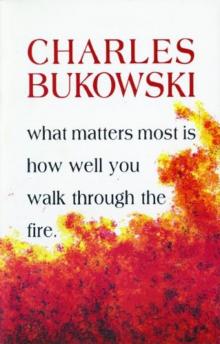 Burning in Water, Drowning in Flame
Burning in Water, Drowning in Flame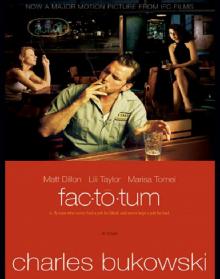 Factotum
Factotum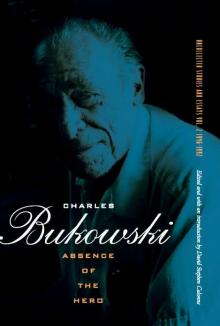 Absence of the Hero
Absence of the Hero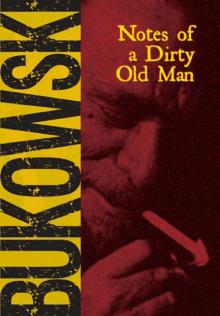 Notes of a Dirty Old Man
Notes of a Dirty Old Man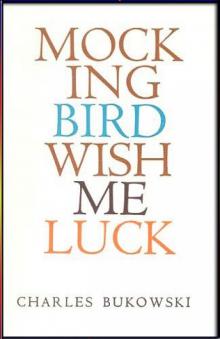 Mockingbird Wish Me Luck
Mockingbird Wish Me Luck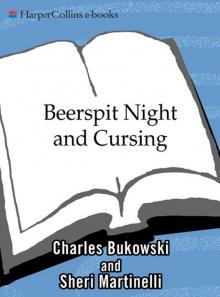 Beerspit Night and Cursing
Beerspit Night and Cursing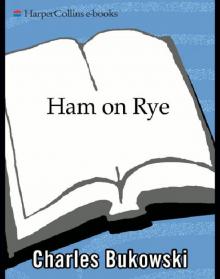 Ham on Rye: A Novel
Ham on Rye: A Novel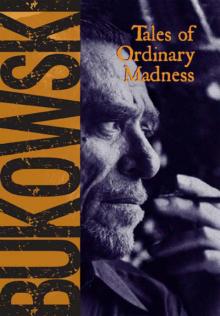 Tales of Ordinary Madness
Tales of Ordinary Madness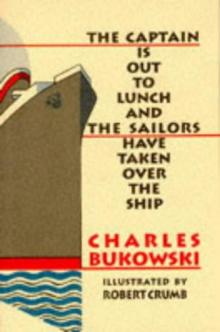 The Captain Is Out to Lunch and the Sailors Have Taken Over the Ship
The Captain Is Out to Lunch and the Sailors Have Taken Over the Ship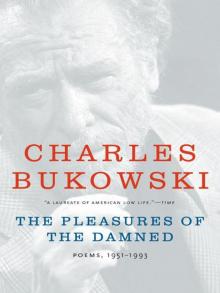 The Pleasures of the Damned
The Pleasures of the Damned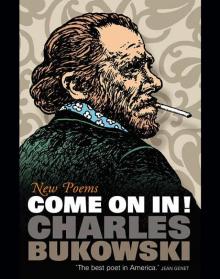 Come on In!
Come on In!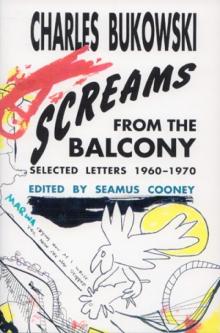 Screams From the Balcony
Screams From the Balcony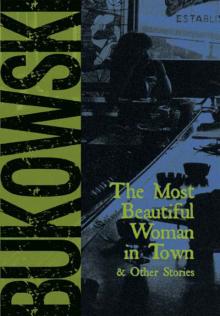 The Most Beautiful Woman in Town & Other Stories
The Most Beautiful Woman in Town & Other Stories New Poems Book 3
New Poems Book 3 Hot Water Music
Hot Water Music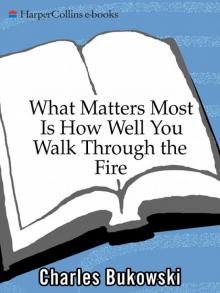 What Matters Most Is How Well You Walk Through the Fire
What Matters Most Is How Well You Walk Through the Fire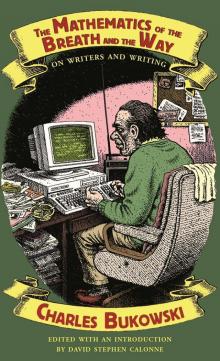 The Mathematics of the Breath and the Way
The Mathematics of the Breath and the Way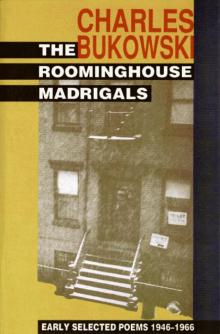 The Roominghouse Madrigals: Early Selected Poems, 1946-1966
The Roominghouse Madrigals: Early Selected Poems, 1946-1966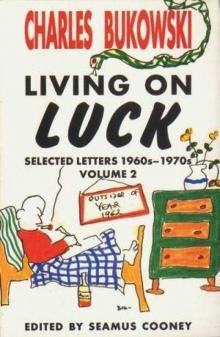 Living on Luck
Living on Luck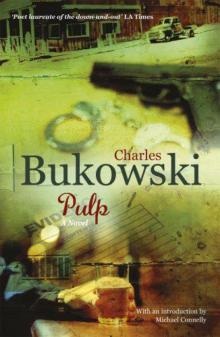 Pulp
Pulp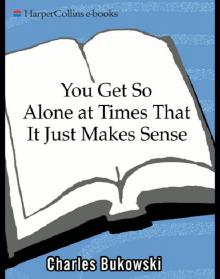 You Get So Alone at Times That It Just Makes Sense
You Get So Alone at Times That It Just Makes Sense Post Office: A Novel
Post Office: A Novel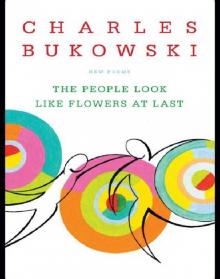 The People Look Like Flowers at Last: New Poems
The People Look Like Flowers at Last: New Poems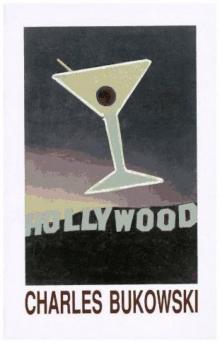 Hollywood
Hollywood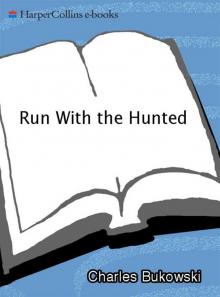 Run With the Hunted: A Charles Bukowski Reader
Run With the Hunted: A Charles Bukowski Reader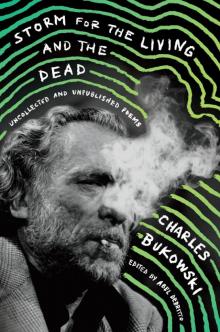 Storm for the Living and the Dead
Storm for the Living and the Dead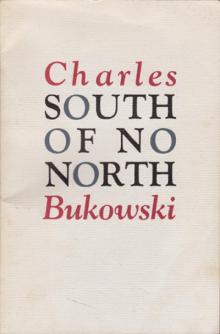 South of No North
South of No North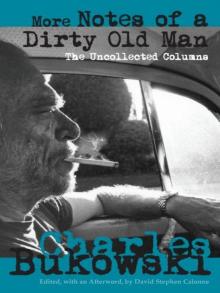 More Notes of a Dirty Old Man: The Uncollected Columns
More Notes of a Dirty Old Man: The Uncollected Columns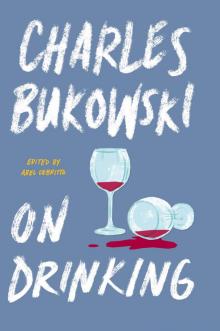 On Drinking
On Drinking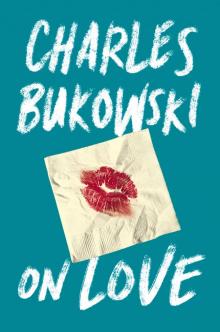 On Love
On Love The Days Run Away Like Wild Horses
The Days Run Away Like Wild Horses Play the Piano
Play the Piano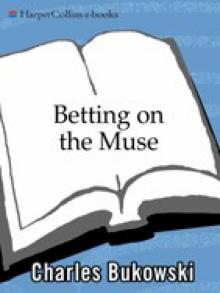 Betting on the Muse
Betting on the Muse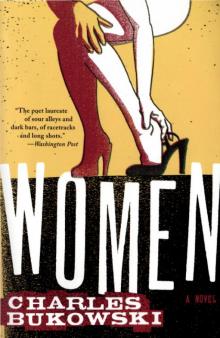 Women
Women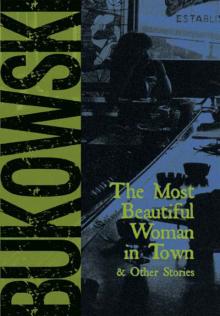 The Most Beautiful Woman in Town
The Most Beautiful Woman in Town The Captain Is Out to Lunch
The Captain Is Out to Lunch Ham On Rye
Ham On Rye New Poems Book Three
New Poems Book Three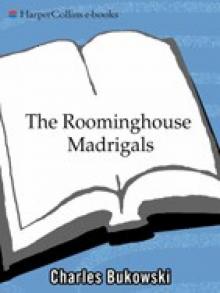 The Roominghouse Madrigals
The Roominghouse Madrigals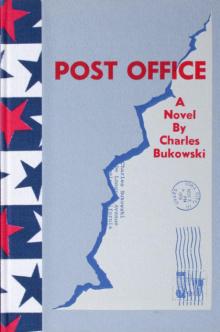 Post Office
Post Office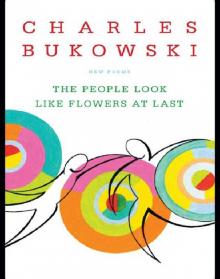 The People Look Like Flowers At Last
The People Look Like Flowers At Last